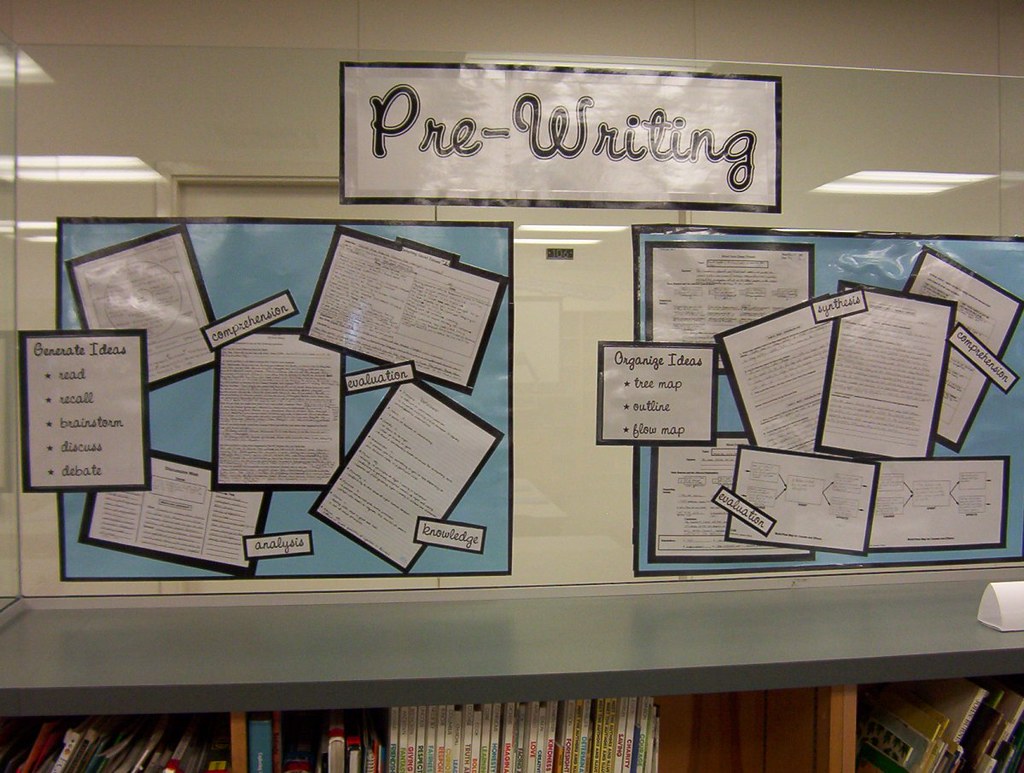Writing assignments have long been a staple of education, whether it be in primary school or at the university level. However, with the rise of artificial intelligence (AI), writing assignments are now entering a new age. The use of AI-powered writing tools is changing the way students approach their writing tasks and the way teachers grade them. In this blog post, we explore how AI is transforming writing assignments and what it means for the future of education. Get ready to be amazed by what’s possible in this exciting new era of writing!

The Rise of AI-Powered Writing Assignments
In recent years, AI-powered writing assignments have become increasingly popular in classrooms and educational institutions. This technology uses algorithms and natural language processing to provide students with instant feedback on their writing assignments. With the rise of AI-powered writing, teachers are able to provide more personalized feedback to students, helping them improve their writing skills and develop critical thinking abilities. This technology also allows for a more efficient grading process, freeing up time for teachers to focus on other aspects of their job. As AI technology continues to advance, it is expected that it will play an even greater role in the future of education and the writing industry as a whole.

The Benefits of AI-Powered Writing for Students and Teachers
AI-Powered Writing has numerous benefits for both students and teachers. Firstly, it allows for personalized feedback on writing assignments. AI algorithms can analyze a student’s writing style, grammar, and vocabulary to provide specific feedback on areas that need improvement. This helps students to understand their strengths and weaknesses in writing and improve their skills over time.
Secondly, AI-powered writing assignments can save teachers a significant amount of time. Grading papers can be a tedious and time-consuming task, but with AI technology, teachers can grade assignments quickly and efficiently. This frees up more time for lesson planning and other important tasks.
Lastly, AI-powered writing assignments can help to reduce bias in grading. The algorithms used in AI technology are designed to be objective and fair, which means that students are graded based on the quality of their work rather than any other factors.
Overall, the benefits of AI-powered writing assignments are clear. They provide personalized feedback, save time for teachers, and reduce bias in grading. As technology continues to advance, we can expect even more improvements in the future.
How AI-Powered Writing is Revolutionizing the Writing Assignment Process
AI-Powered Writing is Revolutionizing the Writing Assignment Process
Artificial intelligence has made significant strides in recent years, and it is now being used to revolutionize the writing assignment process. AI-powered writing tools are designed to help students improve their writing skills by providing real-time feedback on grammar, spelling, and syntax errors. These tools also provide suggestions for improving sentence structure and vocabulary usage.
One of the key benefits of AI-powered writing is that it allows students to receive immediate feedback on their work. This can be particularly helpful for students who struggle with writing or who are not native English speakers. By receiving instant feedback, students can make corrections and improvements as they go, rather than waiting for a teacher to grade their work.
Another benefit of AI-powered writing is that it can help teachers save time grading assignments. Instead of spending hours grading papers, teachers can use AI-powered tools to provide automated feedback on student work. This allows teachers to focus on providing more personalized feedback and support to students who need it most.
Overall, AI-powered writing is transforming the way we approach writing assignments in the classroom. By providing real-time feedback and saving teachers time, these tools are helping students improve their writing skills and achieve better academic outcomes.

The Future of Writing Assignments: A Look into AI Technology
AI technology has come a long way in recent years, and its impact on the writing industry is undeniable. In the future, AI-powered writing assignments will become more common as educators and students alike begin to see the benefits of this technology. AI can help students improve their writing skills by providing instant feedback on grammar, syntax, and other elements of good writing. It can also help teachers save time by automating the grading process and providing more detailed feedback to students. However, there are still limitations to what AI can do when it comes to evaluating writing assignments. While AI can catch errors in grammar and syntax, it may not be able to evaluate more subjective elements of writing such as tone or style. As AI technology continues to evolve, we can expect to see even more advancements in the field of AI-powered writing assignments.
The Role of AI in Improving Student Writing Skills
The role of AI in improving student writing skills is significant. AI-powered writing tools can provide students with instant feedback on their writing, highlighting areas for improvement and suggesting corrections. This immediate feedback allows students to learn from their mistakes and make corrections in real-time, which can help them improve their writing skills faster than traditional methods.
Additionally, AI-powered tools can help students develop critical thinking skills by prompting them to consider alternative phrasing or sentence structures. These prompts encourage students to think creatively about their writing and consider different approaches to expressing their ideas.
Furthermore, AI-powered tools can help students develop better research skills by suggesting relevant sources and providing summaries of key points. This not only saves time but also helps students learn how to evaluate sources and identify the most important information. Overall, incorporating AI-powered writing assignments into the classroom can help students develop essential writing skills while also preparing them for the future of technology in education and beyond.
How to Incorporate AI-Powered Writing Assignments in Your Classroom
Incorporating AI-powered writing assignments in the classroom is a great way to prepare students for the future of work. By using AI technology, teachers can provide immediate feedback on student writing which helps them improve their skills faster. Additionally, AI-powered grading systems are able to analyze large volumes of data and provide more accurate grades based on specific criteria rather than subjective grading by humans.
There are several ways to incorporate AI into writing assignments such as using online tools like Grammarly or ProWritingAid, which use algorithms to suggest improvements on grammar, spelling and style. Teachers can also use platforms like Turnitin Feedback Studio or Gradescope for automated error detection and evaluation.
It’s important to note that while AI offers numerous benefits in terms of speed and accuracy, it cannot replace human feedback entirely. Students still need guidance from their teacher and the opportunity for one-on-one interaction when it comes to improving their writing skills.
Overall, incorporating AI-powered writing assignments into your curriculum is a smart move towards preparing students for success in today’s fast-paced digital world.

Addressing Concerns: Can AI Really Replace Human Grading?
As AI-powered writing assignments become more prevalent in classrooms, many are skeptical about whether or not they can truly replace human grading. While AI can accurately assess grammar, spelling, and even some aspects of content, it still lacks the ability to fully understand context and creativity. This means that AI is currently unable to provide feedback on elements such as tone, voice, and style which are important components of effective writing.
However, proponents argue that the use of AI has its benefits. For one thing, it reduces teacher workload significantly allowing them to focus on providing higher level feedback instead of tedious grammar checks. Additionally, AI is able to quickly analyze large amounts of data which enables teachers to gain insights into student performance over time with greater precision than ever before.
Overall though, while there may be certain limitations at present with using AI for grading writing assignments down the line we could see vast improvements thanks to technological advancements in machine learning algorithms and natural language processing systems.

The Impact of AI on the Writing Industry: What You Need to Know
How AI is Revolutionizing the Writing Assignment Process
AI technology is transforming the way writing assignments are created and graded. Automated essay grading has already been adopted by many universities, saving instructors countless hours of grading time. AI-powered writing assistants are also becoming increasingly popular among students to help them improve their writing skills through personalized feedback and suggestions for improvement. Furthermore, plagiarism detection software powered by AI can quickly scan essays for any signs of academic dishonesty. These developments in AI have allowed for more efficient and effective ways of evaluating student work while still maintaining academic integrity. The future looks bright as AI continues to play a significant role in the evolution of writing assignments.
The Benefits and Limitations of AI-Powered Writing Assignments
AI-powered writing assignments have had a significant impact on the writing industry. One of the benefits is that it has made the writing process more efficient and streamlined. With AI, students can receive instant feedback on their writing, which helps them improve their skills faster. Additionally, teachers can save time grading assignments and focus on providing more personalized feedback to their students.
However, there are also limitations to AI-powered writing assignments. AI may not be able to fully understand the nuances of language and context, leading to errors in grading or feedback. It is important for educators to use AI as a tool rather than a replacement for human grading and feedback. By understanding both the benefits and limitations of AI-powered writing assignments, educators can make informed decisions about how to incorporate this technology into their classrooms.
The Role of Educators in the Age of AI-Powered Writing Assignments
Educators play a critical role in ensuring that AI-powered writing assignments are implemented effectively. They need to understand the capabilities of the technology and how it can be used to improve student learning outcomes. As students become more familiar with using AI for their writing, educators must also adapt their teaching methods accordingly. By providing feedback on both content and style, educators can help students understand how to use AI tools effectively while still maintaining originality and authenticity in their work. Additionally, educators must continuously educate themselves on emerging technologies and stay up-to-date with best practices for integrating AI into the classroom. With proper guidance from teachers, AI-powered writing has the potential to revolutionize the way we teach writing skills and prepare our students for future success.
The Future of Writing Assignments: A Look at Emerging AI Technologies
As AI technology continues to advance, the future of writing assignments looks promising. Emerging AI technologies such as natural language processing and machine learning are already being integrated into writing tools and software, making it easier for writers to produce high-quality content. These technologies are also being used to analyze large amounts of data and provide insights into writing trends and patterns. In the future, we can expect AI-powered writing assignments to become even more sophisticated, providing personalized feedback and suggestions for improvement. With the help of AI, students can develop stronger writing skills and become more confident in their abilities.

Exploring the Limitations and Possibilities of AI-Powered Writing Assignments
Limitations and Possibilities of AI-Powered Writing Assignments
While AI-powered writing assignments have numerous benefits, there are also limitations to consider. One major concern is the potential for bias in the algorithms used to grade student work. Additionally, AI may struggle with understanding more nuanced aspects of writing such as tone and voice.
However, there are also exciting possibilities for AI-powered writing assignments. For example, AI can provide immediate feedback to students, allowing them to make revisions and improve their writing skills in real-time. AI can also analyze large amounts of data to identify patterns and trends in student writing, providing valuable insights for teachers.
Ultimately, the success of AI-powered writing assignments will depend on finding a balance between the limitations and possibilities. By acknowledging the potential challenges and working to address them, we can fully embrace the benefits of this innovative technology in the classroom.
Embracing the Future: Why AI-Powered Writing Assignments are Here to Stay
AI-powered writing assignments are revolutionizing the way students and teachers approach writing. As technology advances, it’s important to embrace the future of AI-powered writing rather than fear it. With AI technology, students can receive instant feedback on their writing, allowing them to make improvements in real-time. Teachers can also use this technology to identify patterns and provide personalized feedback tailored to each student’s needs.
It’s important for educators to understand the limitations and possibilities of AI-powered writing assignments so that they can make informed decisions about incorporating this technology into their classrooms. While AI may never be able to replace human grading entirely, it has the potential to significantly enhance the learning experience for both students and teachers.
As we move forward into a world where AI is becoming increasingly prevalent in all areas of our lives, embracing this new age of writing will be vital for staying ahead of the curve and preparing our students for success in an ever-changing world.
In conclusion, AI-powered writing assignments are the future of writing. With the rise of AI technology, students and teachers alike can benefit from the efficiency and accuracy that AI-powered writing provides. It is revolutionizing the writing assignment process and improving student writing skills. While there may be concerns about whether AI can replace human grading, it is important to recognize that AI technology is constantly evolving and improving. As we continue to explore the limitations and possibilities of AI-powered writing assignments, it is clear that they are here to stay. Embracing this new age of writing will not only benefit students but also prepare them for a world where technology plays an increasingly important role in all aspects of life.
